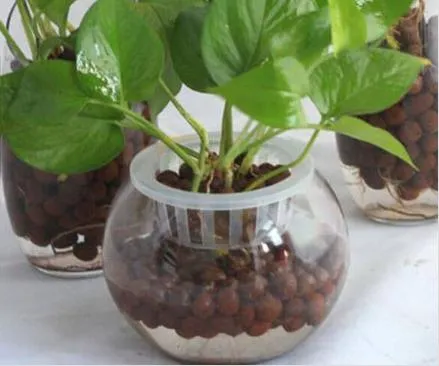When it comes to hydroponics, aquaponics, and soil-less gardening, expanded clay pebbles have become a go-to growing medium for both beginners and experts. These lightweight, porous clay balls—sometimes referred to as bulk expanded clay pebbles or Hydroton expanded clay pebbles—provide excellent aeration, drainage, and root support for plants. But how exactly do they work, and why are they so effective?
In this in-depth guide, we’ll explore the science behind expanded clay pebbles, their benefits, and how to use them effectively in different growing systems. We’ll also answer some of the most frequently asked questions to help you get the most out of this versatile growing medium.

The Science Behind Expanded Clay Pebbles
Expanded clay pebbles are made by heating clay to extremely high temperatures (over 2000°F) in a rotary kiln. This process causes the clay to expand, creating a lightweight, porous structure filled with tiny air pockets. The result is a highly stable, pH-neutral medium that provides multiple benefits for plant growth.
Key Properties of Expanded Clay Pebbles:
Aeration: The porous structure allows oxygen to reach plant roots, preventing suffocation.
Water Retention: While they drain well, the pebbles also hold moisture, keeping roots hydrated.
Neutral pH: Unlike some organic media, bulk expanded clay pebbles don’t alter nutrient solutions.
Reusable: They can be cleaned and sterilized for multiple growing cycles.
Because of these properties, Hydroton expanded clay pebbles are ideal for hydroponic systems, where root oxygenation and moisture balance are critical.
Benefits of Using Bulk Expanded Clay Pebbles
Why should you choose bulk expanded clay pebbles over other growing media? Here are the top advantages:
Superior Drainage and Root Health
Unlike soil, which can compact and suffocate roots, expanded clay pebbles ensure excellent drainage while still retaining some moisture. This prevents root rot and promotes vigorous growth.
Ideal for Hydroponics and Aquaponics
Because they don’t decompose, Hydroton expanded clay pebbles won’t clog hydroponic systems. They also provide a stable environment for beneficial bacteria in aquaponics.
Reusable and Eco-Friendly
Unlike coco coir or peat moss, bulk expanded clay pebbles can be washed, sterilized, and reused for years, making them a sustainable choice.
Lightweight Yet Stable
They are easy to handle but heavy enough to anchor plants securely, making them perfect for both deep water culture (DWC) and ebb-and-flow systems.
The methods of using bentonite pebbles in different systems
Hydroton expanded clay pebbles are versatile and can be used in various growing setups:
Hydroponics
Deep Water Culture (DWC): Supports roots while allowing nutrient-rich water to circulate.
Nutrient Film Technique (NFT): Used as a base to stabilize plants in shallow channels.
Ebb & Flow: Provides excellent drainage during flood cycles.
Aquaponics
Acts as a biofilter, hosting beneficial bacteria that convert fish waste into plant nutrients.
Soil-Based Gardening
Mixed into soil to improve aeration and prevent compaction.
Used as a top dressing to reduce evaporation and weed growth.
Seed Starting and Propagation
Provides a sterile medium for seedlings and cuttings, reducing disease risks.
Common Mistakes When Using Expanded Clay Pebbles
While expanded clay pebbles are highly effective, improper use can lead to problems:
Not Rinsing Before Use:
Dust and debris from manufacturing can clog systems—always rinse bulk expanded clay pebbles thoroughly before planting.
Overlooking pH Checks:
Though pH-neutral, they can sometimes carry residual alkalinity. Test and adjust your nutrient solution accordingly.
Reusing Without Sterilization:
Reusing Hydroton expanded clay pebbles without proper cleaning can introduce pathogens. Soak in hydrogen peroxide or bleach solution between cycles.
Using the Wrong Size:
Larger pebbles may not support small seedlings, while tiny ones can restrict airflow. Choose the right size for your plants.
FAQs About Expanded Clay Pebbles
How long do expanded clay pebbles last?
With proper care, expanded clay pebbles can last 5-10 years, making them a cost-effective long-term investment.
Can Hydroton expanded clay pebbles be used in organic gardening?
Yes! They are inert and work well in organic systems, especially when combined with compost teas or organic nutrients.
Do bulk expanded clay pebbles need to be soaked before use?
Soaking helps remove dust and ensures better water retention, but it’s not strictly necessary if thoroughly rinsed.
Can I mix expanded clay pebbles with soil?
Absolutely—they improve drainage and aeration in potting mixes, preventing root suffocation.
Are Hydroton expanded clay pebbles better than perlite or vermiculite?
They offer better reusability and stability than perlite (which breaks down) and better drainage than vermiculite (which retains too much water).
Whether you're a hydroponics enthusiast, an aquaponics farmer, or a soil gardener looking for better aeration, expanded clay pebbles offer unmatched benefits. Their durability, reusability, and plant-friendly properties make them a smart choice for sustainable growing.
Ready to boost your plant growth? Try high-quality bulk expanded clay pebbles today and experience the difference in root health, yield, and ease of use. Your plants will thank you!
-
The Versatile World of Phlogopite Mica: Properties, Forms, and ApplicationsNachrichtJul.14,2025
-
The Versatile Applications of Calcined Mica: From Decoration to Industrial UseNachrichtJul.14,2025
-
The Role of Muscovite Mica in Industrial Insulation MaterialsNachrichtJul.14,2025
-
The Benefits of Using Expanded Clay Pebbles in Hydroponics and Soil GardeningNachrichtJul.14,2025
-
Innovative Applications of Mica Flake in Paints and CoatingsNachrichtJul.14,2025
-
Gardening Expanded Clay Usage: A Complete GuideNachrichtJul.14,2025
-
The Use of Natural Mica Powder in Skincare ProductsNachrichtJun.11,2025








